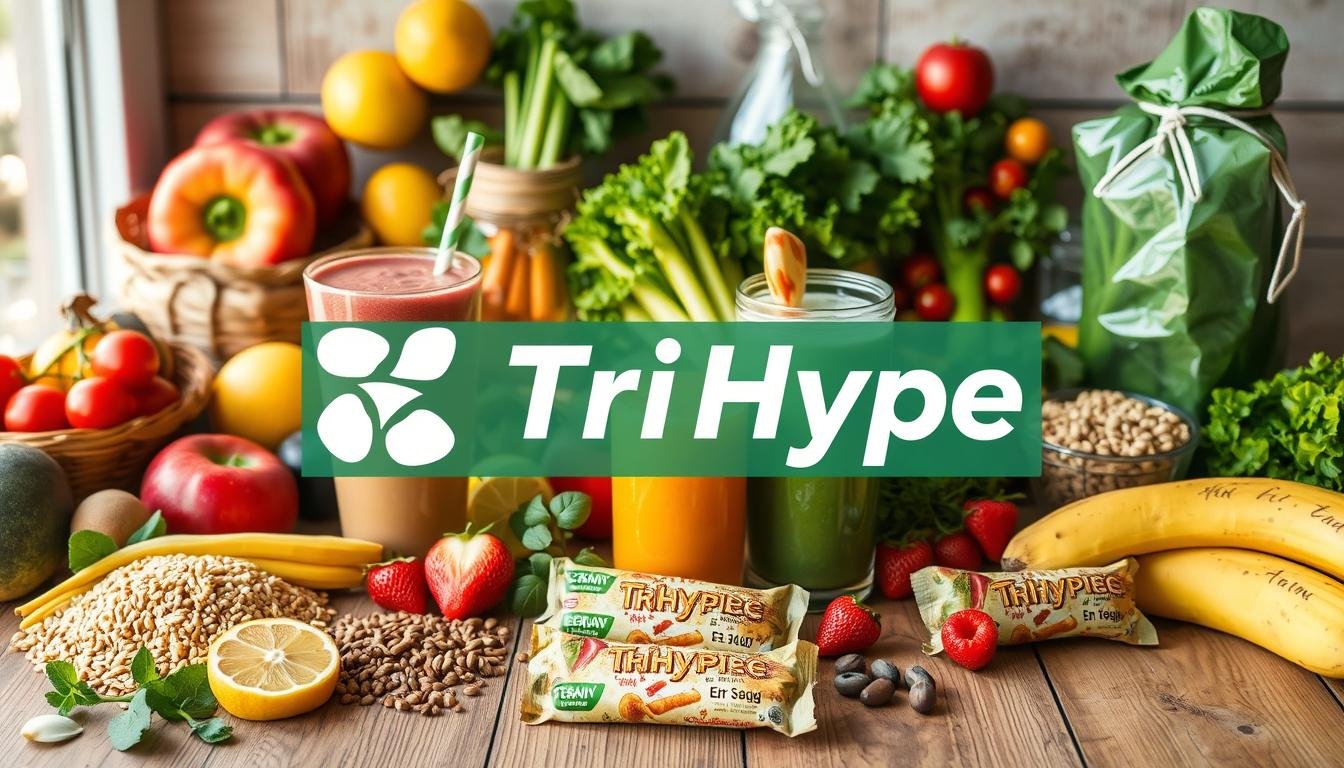Did you know that 85% of elite athletes say proper nutrition and hydration are key to their success? In this guide, we’ll share important sports nutrition tips to boost your athletic performance. We’ll talk about the right mix of macronutrients, how to fuel up before workouts, and the best times to eat. We’ll also cover staying hydrated, recovery nutrition, and the benefits of sports supplements.
These tips are for anyone who wants to perform better, whether you’re a pro athlete or just enjoy staying active. By following these strategies, you’ll learn how to fuel your body for the best results.
Key Takeaways
- Proper nutrition and hydration are crucial for athletic success
- Understanding macronutrient ratios can help you fuel your body effectively
- Timing your nutrient intake around workouts is key for performance and recovery
- Staying hydrated and maintaining electrolyte balance is essential for optimal performance
- Incorporating sports supplements can enhance your athletic abilities, when used safely and responsibly
The Power of Proper Nutrition
As athletes, we know how key nutrition is to our performance. The right food is the key to success in sports. We’ll look at the importance of macronutrients and the role of micronutrients.
Understanding Macronutrient Ratios
Finding the right mix of carbohydrates, proteins, and fats is vital. This mix, or macronutrient ratio, changes based on the sport and personal needs. A good starting point is 45-65% carbs, 10-30% proteins, and 20-35% fats.
Micronutrients: The Hidden Heroes
Micronutrients, like vitamins and minerals, are key for athletes. They boost our immune system, help muscles recover, and improve how our body works. Getting enough of these nutrients can greatly improve our performance and health.
| Nutrient | Key Benefits for Athletes | Food Sources |
|---|---|---|
| Vitamin C | Supports immune function, aids in collagen production for injury recovery | Citrus fruits, bell peppers, broccoli, strawberries |
| Iron | Crucial for oxygen transport and energy production | Red meat, spinach, lentils, fortified cereals |
| Calcium | Maintains bone health and muscle function | Dairy products, leafy greens, fortified plant-based milk |
Knowing about macronutrients and micronutrients helps us create a diet that fuels our bodies. This diet supports our athletic goals.
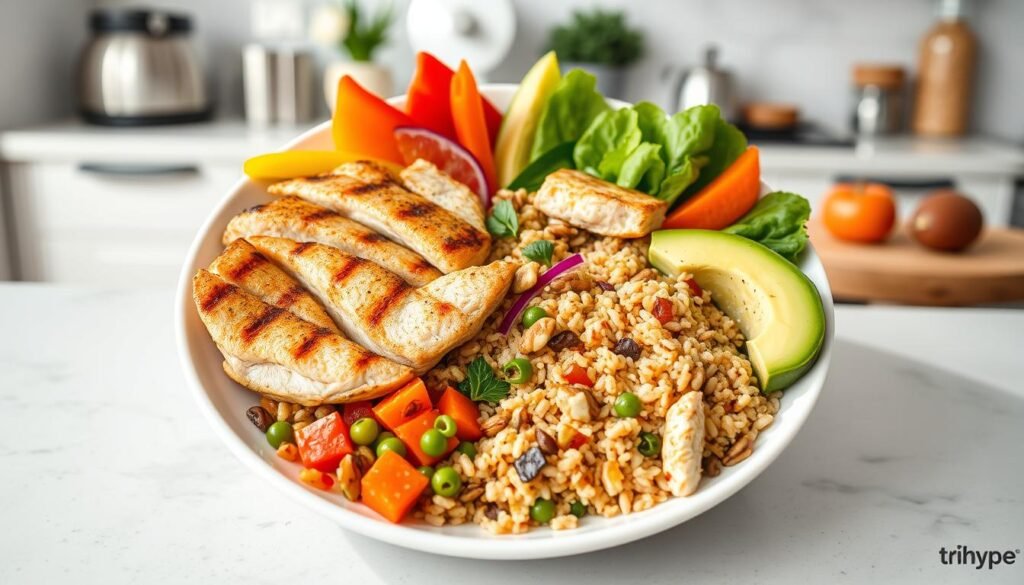
“Proper nutrition is not just about the quantity of fuel, but the quality of that fuel. Micronutrients are the hidden heroes that can make all the difference in athletic performance.” – Renowned Sports Nutritionist, Jane Doe
Pre-Workout Fueling Strategies
Getting the right pre-workout fueling is key to doing well in sports. Eating the right foods at the right time boosts your energy and endurance. Here, we’ll look at how to fuel up before a workout.
When you eat before working out, timing is everything. Eat a meal or snack with carbohydrates, protein, and healthy fats 1-2 hours before. This lets your body digest and use the nutrients for energy during your workout.
For pre-workout fueling, choose foods that are easy to digest and give quick energy. Some good choices are:
- Whole grain toast with nut butter and sliced banana
- Greek yogurt with berries and granola
- Oatmeal with a sprinkle of cinnamon and a hard-boiled egg
- A smoothie with fruit, leafy greens, and protein
Stay away from heavy, fatty meals before working out. They can make you feel uncomfortable and slow you down. Proper nutrient timing is essential for the best results.
| Nutrient | Function | Pre-Workout Recommendations |
|---|---|---|
| Carbohydrates | Provide rapid energy for muscle contractions | 50-100g of easily digestible carbs |
| Protein | Support muscle repair and growth | 10-20g of high-quality protein |
| Healthy Fats | Promote sustained energy release | 5-10g of unsaturated fats |
By using these pre-workout fueling tips, you’ll be ready to reach your athletic goals. You’ll get the most out of your workouts.
Nutrient Timing: When to Eat for Maximum Benefit
Getting the timing right for nutrients is key in sports nutrition. It greatly affects your performance and recovery. Eating carbs and protein at the right times fuels your workouts and helps muscles recover. This helps you achieve your fitness goals.
Carbohydrates: The Fuel for Performance
Carbs are the main energy source for your muscles when you exercise. Eating carbs before a workout gives you a boost. It helps you perform better and delays feeling tired. Try to eat a carb-rich meal or snack 30-60 minutes before your workout for the best pre-workout fueling.
Protein: Building Blocks for Muscle Recovery
Protein is vital for fixing and growing muscles, which is why it’s important after working out. Eating a protein-rich meal or shake within 30 minutes after your workout helps your body recover. This is called the “anabolic window,” a key part of nutrient timing.
| Nutrient | Timing | Benefits |
|---|---|---|
| Carbohydrates | 30-60 minutes before workout | Provides energy for performance |
| Protein | Within 30 minutes after workout | Supports muscle recovery and growth |
Learning about nutrient timing can help you get the most out of your training. Using these strategies in your sports nutrition plan can fuel your success.
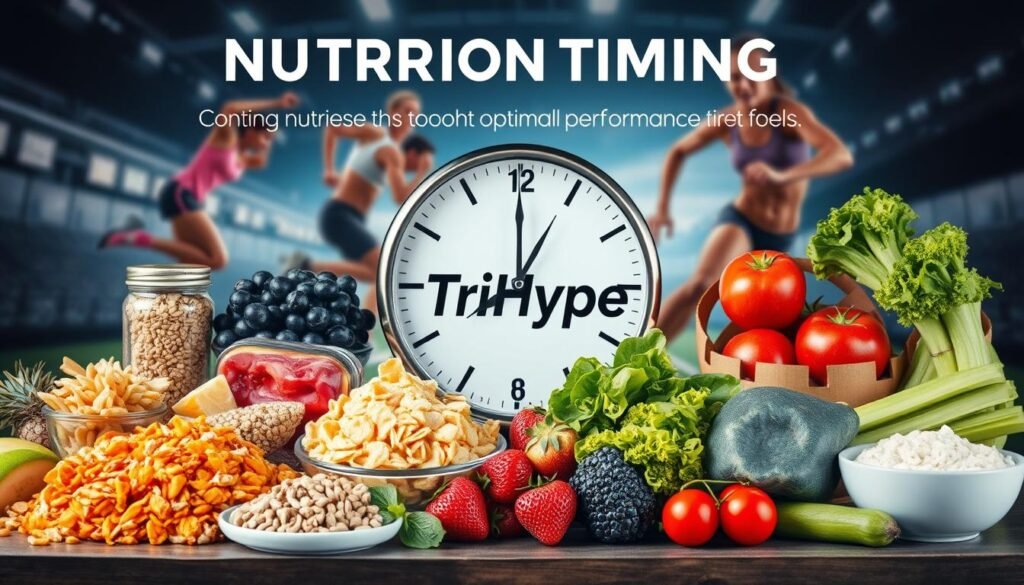
Hydration: The Key to Optimal Performance
Drinking enough water is key for athletes. It helps keep your body fueled and working well. Good hydration strategies are essential for top performance.
Electrolyte Balance: Maintaining Fluid Levels
Electrolytes like sodium, potassium, and magnesium are important. They help control fluid balance and muscle function. When we sweat, we lose these, which can cause dehydration and muscle cramps.
Eating foods and drinks rich in electrolytes helps. This keeps you hydrated and performing well.
- Choose sports drinks or electrolyte water to replace lost electrolytes during and after exercise.
- Eat foods high in potassium, like bananas, avocados, and leafy greens, to support electrolyte balance.
- Take an electrolyte supplement if you can’t get enough from food.
Focus on staying hydrated and keeping electrolyte levels right. This way, your body will be ready to perform at its best, whether you’re running a marathon or lifting weights.
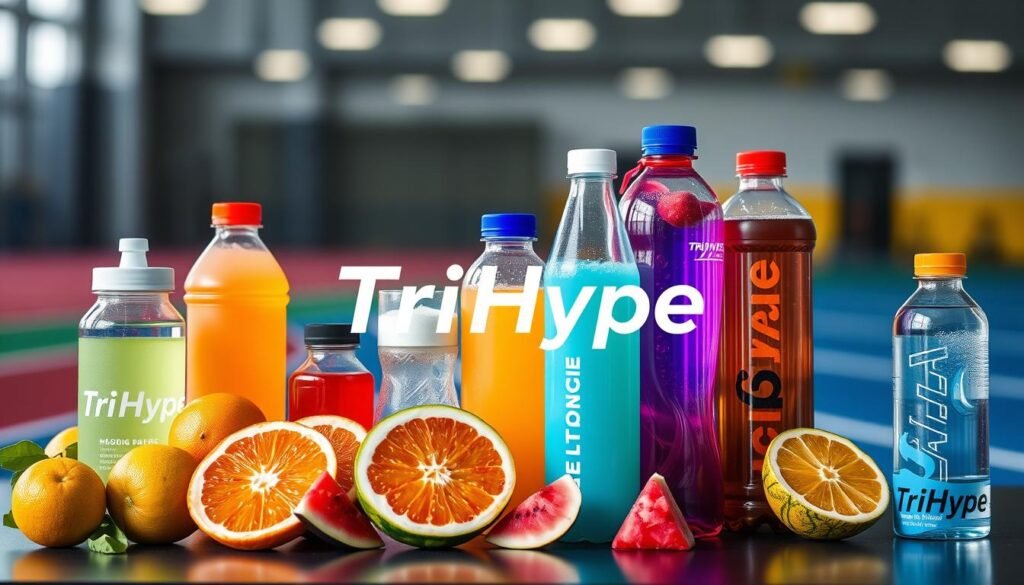
| Hydration Strategies | Electrolyte-Rich Foods |
|---|---|
|
|
“Proper hydration is not just about drinking water – it’s about maintaining the right balance of electrolytes to ensure your body can perform at its best.”
Hydration and electrolyte balance are key for top athletic performance. By following these tips, you can reach your full potential and push your limits.
Sports Nutrition Tips for Endurance Athletes
Endurance athletes face special nutritional challenges. Their sport is very demanding. To improve your performance and recovery, you need a specific nutrition plan. We’ll share key tips to help you optimize your diet and timing.
Fueling Long-Duration Activities
As an endurance athlete, you need constant energy for long workouts and races. Proper nutrient timing is crucial. Here are some tips to fuel your activities:
- Eat carbohydrate-rich meals and snacks before working out to fill glycogen stores.
- Use fast-acting carbs like sports drinks or gels during activities to keep blood sugar up.
- Drink plenty of water and electrolyte-rich drinks to stay hydrated.
Optimizing Recovery
After a tough workout, your body needs to rest and repair. Proper recovery nutrition is vital for endurance athletes. Here are some recovery tips:
- Eat a protein-rich meal or shake within 30 minutes of finishing your workout to start muscle repair.
- Include carbs in your post-workout meal to refill glycogen stores and aid muscle recovery.
- Drink water and electrolyte-rich drinks to replace lost fluids.
| Nutrient | Importance for Endurance Athletes |
|---|---|
| Carbohydrates | Provide the primary fuel source for endurance activities, helping to maintain blood sugar levels and delay fatigue. |
| Protein | Support muscle repair and growth, essential for recovery and building strength. |
| Fluids and Electrolytes | Help maintain hydration and electrolyte balance, which can be depleted during prolonged exercise. |
By following these sports nutrition tips, endurance athletes can fuel their healthy diet and improve their nutrient timing. This will help enhance performance, support recovery, and reach their athletic goals.

Fueling for Strength and Power
As athletes aiming for strength and power, our diet needs are different. We focus on protein and consider sports supplements like creatine. This helps our muscles grow and boosts our power.
Protein and Muscle Growth
Protein is key for muscle building. Studies show that more protein helps muscles grow and recover faster. Strength athletes should eat 1.6 to 2.2 grams of protein per kilogram of body weight daily.
Creatine: A Performance Enhancer
Creatine is a top sports supplement for strength and power athletes. It boosts muscle creatine, improving high-intensity workouts and muscle gain. Many studies prove creatine’s benefits for strength, power, and muscle growth.
By eating the right foods, especially protein, and using sports supplements like creatine, we can reach our strength and power goals.
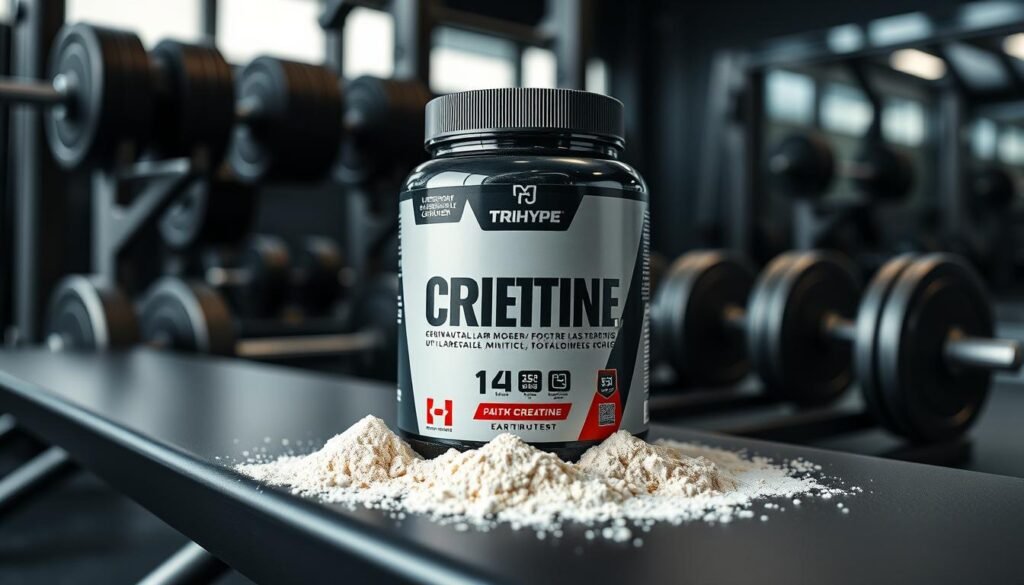
“Creatine is one of the most well-studied and effective sports supplements for improving high-intensity exercise performance and muscle growth.”
Recovery Nutrition: Refueling and Rebuilding
In sports and athletic performance, recovery nutrition is key. After intense workouts or competitions, our bodies need specific nutrients to recover and get ready for more. The nutrient timing after exercise is very important for recovery.
Maximizing the Post-Workout Nutrition Window
The first 30-60 minutes after exercise is crucial. Our muscles are ready to take in and use important nutrients like carbs and protein. These help refill energy and fix muscles.
- Eat a meal or snack with carbs and protein within this time to help recover.
- Choose easy-to-digest carbs like whole grains, fruits, or dairy to quickly refuel.
- Include lean protein like chicken, fish, or plant-based options for muscle repair.
By using this nutrition window, you can get the most from your training and get ready for the next session.
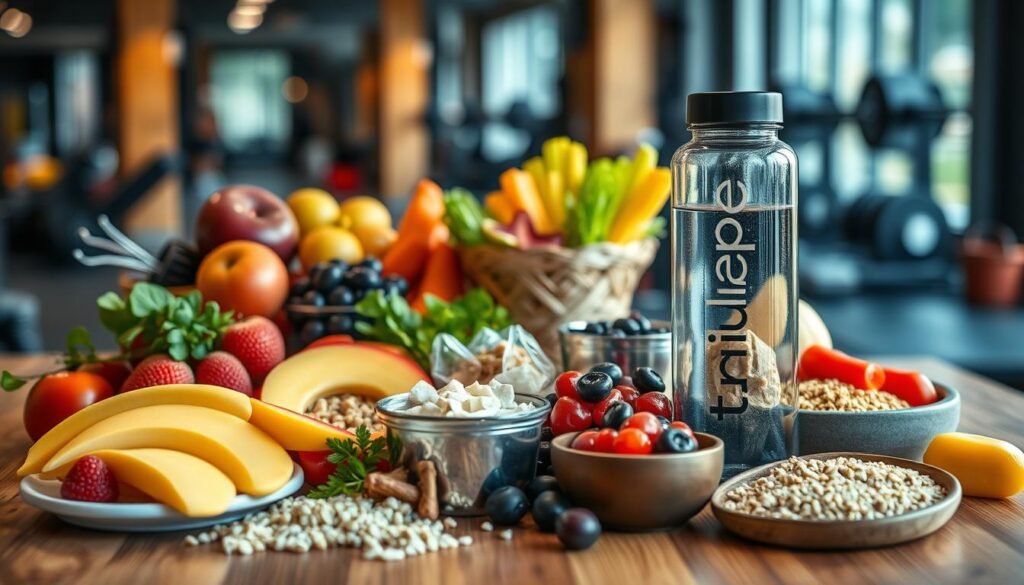
“Proper recovery nutrition is the foundation for sustained athletic performance and progress. Neglecting this critical aspect can lead to increased fatigue, reduced performance, and suboptimal gains.”
Remember, the goal of post-workout recovery is to refuel, rehydrate, and rebuild. By focusing on recovery nutrition, you’ll keep making progress and achieving success in your athletic journey.
Supplements: Enhancing Performance Safely
Sports supplements can help improve athletic performance, but we need to be careful. Athletes should check the claims and choose high-quality products. This way, we can enjoy the benefits without risking our health.
Evaluating Supplement Claims
When looking at sports supplements, we must be skeptical of marketing claims. We should look for solid scientific evidence to back up the benefits. Also, it’s important to know what’s in the supplement and how it’s made.
- Examine the scientific literature for evidence-based support
- Seek out supplements that disclose their full ingredient list and manufacturing practices
- Consult with healthcare professionals or registered dietitians for personalized guidance
By carefully checking the claims, we can make smart choices. This helps us meet our athletic goals and improve our nutrient timing and performance.
“The key to unlocking the full potential of sports supplements lies in understanding their proper use and integration within a comprehensive nutrition plan.”
Remember, supplements are not a substitute for a healthy diet. Eating whole, unprocessed foods is key. Adding supplements wisely can help us perform better and stay healthy.
Sports Nutrition Tips for Vegetarian and Vegan Athletes
Vegetarian and vegan athletes face special nutrition challenges. But, with the right approach, they can excel and reach their fitness goals. Here are key sports nutrition tips for them.
Ensuring Adequate Protein Intake
Protein is vital for muscle growth and recovery. Vegetarian and vegan athletes must focus on getting enough plant-based protein. Foods like tofu, tempeh, lentils, chickpeas, and quinoa are great sources. Eating a variety of these foods daily helps meet protein needs.
Optimizing Nutrient Timing
Timing nutrients is crucial for vegetarian and vegan athletes. Eating a mix of carbs, proteins, and fats before, during, and after workouts boosts energy and aids in muscle recovery.
Addressing Potential Nutrient Deficiencies
Vegetarian and vegan athletes might face deficiencies in iron, zinc, vitamin B12, and omega-3 fatty acids. Eating nutrient-rich foods, fortified products, or supplements can help. This ensures they stay healthy and perform well.
Consulting with a Sports Nutritionist
Getting advice from a sports nutritionist who knows plant-based diets is very helpful. They offer tailored meal plans and advice on nutrients. This helps athletes avoid deficiencies and reach their goals.
By following these tips, vegetarian and vegan athletes can perform at their best. They can do this while staying true to their dietary choices and values.
Nutrition for Injury Prevention and Recovery
As athletes, we know how important good nutrition is for our performance and health. But did you know it also helps prevent and recover from injuries? We’ll look at how certain foods can help avoid injuries and speed up healing, so we can get back to our sport safely.
Eating a healthy diet for athletes is key to preventing injuries. Eating the right mix of carbs, proteins, and fats strengthens our muscles and bones. Also, getting enough vitamins and minerals helps our body heal faster and keeps us from getting sick.
For recovery nutrition, what we eat after working out matters a lot. Eating carbs and proteins within an hour after exercise helps our muscles recover and reduces swelling. This quick nutrition plan helps us heal faster and get back to playing sooner.
| Nutrient | Role in Injury Prevention and Recovery |
|---|---|
| Protein | Builds and repairs muscle, tendon, and bone tissue |
| Vitamin C | Supports collagen production and immune function |
| Omega-3 fatty acids | Reduces inflammation and promotes tissue healing |
| Calcium | Strengthens bones and prevents stress fractures |
By following these healthy diet for athletes and recovery nutrition tips, we can prevent injuries and recover faster. This sets us up for success in our sport for the long term.
“Proper nutrition is the foundation of athletic performance and injury resilience. It’s not just about what we eat, but when and how we fuel our bodies.” – Renowned Sports Nutritionist, Jane Doe
Creating a Personalized Nutrition Plan
Creating a healthy diet is key for athletes to perform their best. We’ll show you how to make a sports nutrition plan that fits your needs. This plan will fuel your body for top performance.
Tracking and Adjusting Your Plan
It’s important to track and adjust your nutrition plan. We’ll talk about how to monitor your energy and recovery. This way, you can make changes to reach your athletic goals.
- Start by looking at your current diet and what you can improve.
- Set clear goals for your nutrition plan.
- Figure out your nutrient needs based on your activity level.
- Make a meal plan that supports your performance and recovery.
- Keep track of your progress and adjust your plan as needed.
By following these steps, you can create a nutrition plan that boosts your athletic performance. This will help you reach your fitness goals.
“Proper nutrition is the foundation of athletic success. A customized plan can make all the difference in your performance and recovery.”
Nutrition: Essential Guide to Healthy Eating
Conclusion
In this guide, we’ve shared many sports nutrition tips. These tips help you fuel your athletic performance and reach your fitness goals. By knowing how to eat right, fueling well, and using supplements, you can be your best as an athlete.
It’s important to make your nutrition plan your own. Keep track of it and change it when needed. Use these tips to help you get better at sports and reach new fitness levels.
This article aims to help you, the athlete, make smart nutrition choices. By using these tips, you can boost your energy, recover faster, and achieve your athletic dreams.
